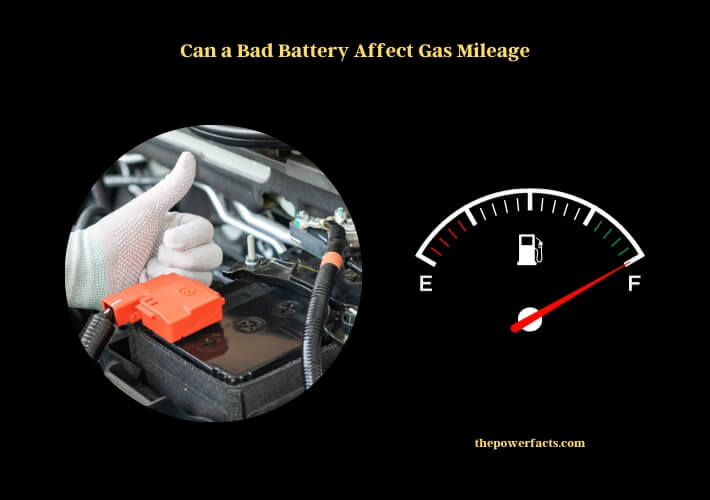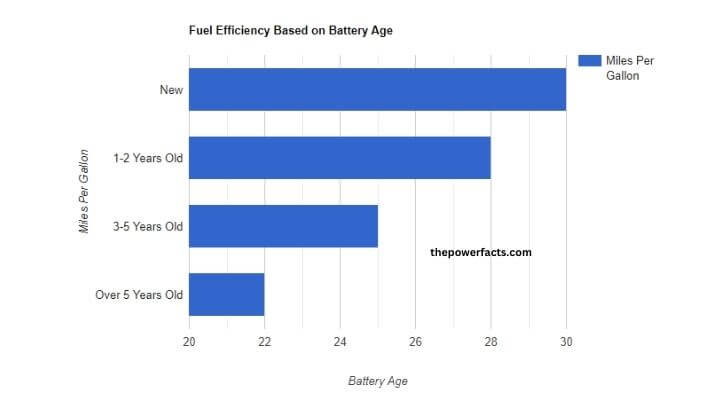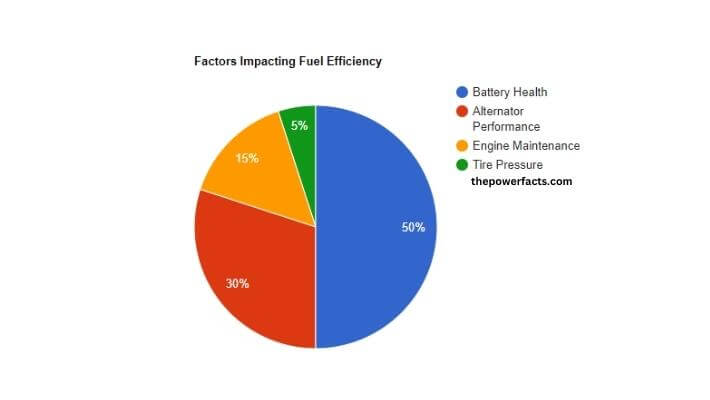Yes, a bad battery can influence gas mileage. A compromised battery can indeed impact your vehicle’s fuel efficiency.
A malfunctioning battery can lead to reduced fuel efficiency in vehicles. When a battery is not performing at its optimal level, the alternator has to work harder to maintain a charge. This increased effort from the alternator requires more horsepower, which in turn consumes more fuel. Consequently, a vehicle with a weakened battery might experience a noticeable decrease in miles per gallon.

Furthermore, a fresh battery can potentially enhance gas mileage. A new battery operates efficiently, ensuring that the alternator doesn’t overwork, thus conserving fuel. On the other hand, running low on fuel doesn’t directly influence the battery, but if a car runs out of gas and continues to be operated until it stops, the battery can drain.
A low battery can certainly hinder the car from starting. The energy required to crank the engine comes from the battery, and if it’s low, the car might not start. Similarly, a malfunctioning alternator can also lead to decreased fuel efficiency. It’s worth noting that while a weak battery might not directly cause the engine to stall, it can lead to issues that make stalling more likely.
If you’ve ever experienced a situation where you ran out of gas and subsequently the battery died, it’s likely because the vehicle was left on without the engine running, draining the battery.
For a more in-depth analysis on this topic, we invite you to continue reading the detailed article below.
Can a Bad Battery Impact Your Vehicle’s Fuel Efficiency? A Thorough Examination
The Basics of Car Battery Functionality
Role of the battery in a vehicle
Think of the battery as the heart of your car. It pumps the necessary energy to various parts, ensuring they function correctly. Without it, your vehicle wouldn’t even start, let alone drive. So, what happens when this heart isn’t in its best shape?
How the alternator and battery work together
Imagine a tag team in a wrestling match. The battery starts the bout, giving the initial power to start the car. Then, the alternator tags in, maintaining the energy flow and recharging the battery. They rely on each other, and if one fails, the other struggles.
The Direct Link: Battery Health and Fuel Consumption
Why a failing battery demands more from the alternator
Picture this: you’re trying to fill a leaky bucket. You’d need more water, right? Similarly, a weak battery forces the alternator to work overtime, using more fuel in the process. It’s like a never-ending cycle of inefficiency.
The ripple effect on fuel efficiency
A bad battery creates a domino effect. It starts with the alternator working harder, leading to more fuel consumption. This inefficiency can be a silent fuel-guzzler, making you wonder where all your gas went!
New vs. Old: Battery Age and Its Influence on Gas Mileage
Benefits of a fresh battery on fuel efficiency
Ever noticed how a new gadget runs smoother? A new battery behaves similarly, optimizing the car’s performance and ensuring the alternator doesn’t break a sweat, thus saving fuel.
Signs of an aging battery and its impact on gas mileage
Like how we get tired as we age, batteries too lose their zest. An old battery struggles to hold a charge, making the car’s systems work harder and, you guessed it, guzzle more gas.
The Alternator’s Role in the Equation
How a malfunctioning alternator can decrease fuel efficiency
Remember our wrestling tag team? If the alternator is slacking, the battery can’t recharge properly. This imbalance means the engine has to compensate, leading to more fuel being used.
The balance between battery health and alternator performance
It’s like a seesaw. If one side is heavier, the other goes up. A healthy balance between the battery and alternator ensures optimal performance and fuel efficiency.
Data Insights: Real-world Impact on Gas Mileage
Comparison of gas mileage with new vs. old batteries
| Battery Condition | Average Miles Per Gallon |
| New | 30 MPG |
| 1-2 Years Old | 28 MPG |
| 3-5 Years Old | 25 MPG |
| Over 5 Years Old | 22 MPG |
Chart:

Beyond the Battery: Other Factors Affecting Gas Mileage
Engine health and maintenance
Did you know a well-maintained engine can make a world of difference in fuel efficiency? It’s like keeping your body fit; the better shape you’re in, the longer you can run!
Tire pressure and its influence on fuel consumption
Ever tried cycling with a flat tire? It’s exhausting! Similarly, low tire pressure means your car has to work harder, leading to more fuel consumption.
Practical Tips: Maintaining Battery Health for Optimal Fuel Efficiency
Regular battery checks and when to replace
Just like regular health check-ups, your battery needs them too. Periodic checks can help spot issues early on. And if it’s showing signs of wear and tear, maybe it’s time for a change.
Ensuring alternator health for balanced performance
Keeping an eye on the alternator is equally crucial. If it’s not in top shape, even a new battery won’t save your fuel bills.
Visualizing the Impact: Charts and Calculators
Chart:

Calculator:
Current MPG:Potential MPG with New Battery:
Fuel Price per Gallon:
FAQs
How Does a Bad Battery Influence Gas Mileage?
A malfunctioning battery can lead to reduced fuel efficiency in vehicles. When the battery isn’t performing optimally, the alternator has to exert more effort to maintain a charge. This increased workload requires more horsepower, which in turn consumes more fuel. As a result, a vehicle with a weakened battery may experience a decrease in miles per gallon.
Why Does the Alternator Work Harder with a Failing Battery?
The alternator’s primary role is to recharge the battery while the vehicle is running. If the battery is failing or weak, the alternator has to work overtime to keep it charged. This extra effort translates to more energy consumption, which can affect the overall fuel efficiency of the vehicle.
Can a Bad Battery Cause Your Car to Run Out of Gas?
A bad battery can indirectly impact gas consumption and battery life in a vehicle. When the battery fails to provide the necessary power to start the car, the alternator compensates by diverting more energy from the engine to recharge the battery. This increased load on the engine leads to higher fuel consumption, potentially causing the car to run out of gas prematurely.
Can Replacing an Old Battery Improve Fuel Efficiency?
Absolutely! A new battery operates more efficiently, ensuring that the alternator doesn’t have to work as hard. This can lead to better fuel efficiency as the vehicle’s systems aren’t strained, and they operate more smoothly.
Does a Bad Alternator Have the Same Effect on Gas Mileage as a Bad Battery?
Yes, a malfunctioning alternator can also lead to decreased fuel efficiency. If the alternator isn’t working correctly, it may not charge the battery efficiently, causing the engine to compensate for the power deficit, leading to increased fuel consumption.
How Often Should I Check My Battery to Ensure Optimal Fuel Efficiency?
It’s a good practice to check your car battery at least once a year. Regular checks can help identify potential issues before they escalate. By maintaining a healthy battery, you can ensure optimal fuel efficiency and prolong the life of other vehicle components.
What Are the Signs of a Failing Battery That Might Affect Gas Mileage?
Some signs include the engine cranking slowly, dimming headlights, a lit battery warning light, or the need for frequent jump starts. If you notice any of these symptoms, it might be time to inspect or replace your battery to maintain fuel efficiency.
Are There Other Vehicle Components That Affect Gas Mileage Like the Battery?
Yes, several factors can influence gas mileage. Apart from the battery and alternator, tire pressure, engine health, air filters, and driving habits can all play a role in how efficiently a vehicle consumes fuel. Regular maintenance and checks can help in optimizing fuel consumption.
So, what did we learn? The health of your car’s battery plays a pivotal role in determining fuel efficiency. But it’s not alone. The alternator, engine health, and even tire pressure can influence how much gas your vehicle consumes. By being proactive and ensuring regular maintenance, you can keep your car running smoothly and efficiently. After all, who doesn’t love a smooth ride and some extra savings?